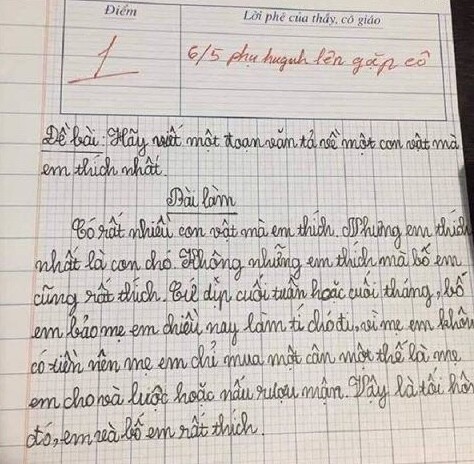Take, for instance, the case of a primary school student who wrote an essay describing their favorite animal. Despite the child’s detailed description, the homeroom teacher immediately requested a parent-teacher conference after reading it. Specifically, the student had written: “There are many animals that I like. But the one I like the most is the dog. Not only do I like it, but my dad also likes it a lot. Every weekend or month-end, my dad would ask my mom to prepare some dog for dinner. Since my mom didn’t have much money, she would only buy a pound of it. Then she would boil or cook it with plum wine. So, my dad and I were very happy that night”.

Interestingly, the teacher was annoyed by the student’s honest essay and gave it a failing grade, adding the comment: “6/5 parents, please meet with me”. Not only the teacher but also the online community was left bewildered by the student’s unconventional essay about a dog. However, the teacher’s decision to give a failing grade and request a parent-teacher conference may have been an overreaction to some of the details mentioned in the essay.
In reality, young children often have simple and innocent thought processes, and they tend to include whatever they observe in their daily lives in their essays. As a result, many teachers have encountered essays that are “comically sad.” In this situation, instead of giving a low grade, the teacher could have provided guidance and feedback to help the student adjust their writing to be more appropriate.
When teaching children how to write descriptive essays, apart from emphasizing accuracy, it is essential to nurture their intelligent thinking and imaginative abilities to create compelling pieces. To help your child excel in this subject, consider the following suggestions:
Read books and tell stories to your child
Reading books and storytelling are excellent ways to stimulate your child’s imagination and develop their language skills. Choose age-appropriate books that align with their interests, discuss the content, and encourage them to share their thoughts. Additionally, allow your child to select some stories to read or retell, as this will enhance their memory, confidence, and creative thinking abilities.
Provide creative toys and tools
One of the best ways to foster your child’s creativity and logical thinking is by providing them with creative toys and tools such as Lego, paper models, pencils, paints, puzzles, and scientific models. These resources will encourage your child to explore patterns, create their own models or paintings, and solve puzzles, thereby enhancing their thinking skills, problem-solving abilities, and stimulating brain development.
Encourage participation in artistic, sporting, and social activities
Involvement in artistic and sporting activities not only enhances children’s artistic and athletic skills but also stimulates their creativity and superior thinking abilities. Furthermore, encouraging children to engage in social activities like volunteering, assisting others, joining clubs, and participating in study groups provides them with opportunities to develop communication skills, acquire knowledge, and foster their creativity.
Do not restrict your child’s imagination
As a parent, it is crucial to accompany your child on their imaginative journeys without imposing restrictions. Create an environment that enables them to freely express their thoughts and ideas and implement them in the most comfortable and natural way possible. When children are encouraged to use their imagination, they can discover and explore the world around them in more creative ways.































